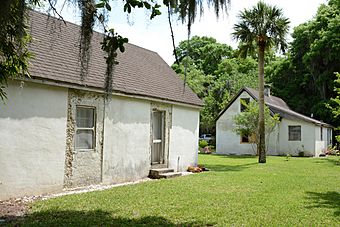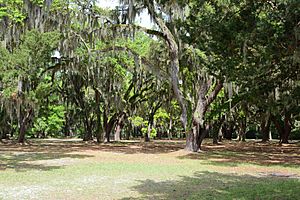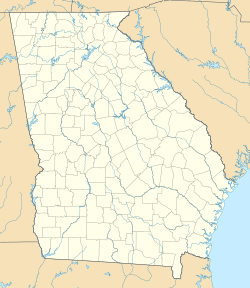Gascoigne Bluff facts for kids
Gascoigne Bluff is a historic spot on the western side of St. Simons Island. It's a small hill next to the Frederica River. Long ago, Native American groups used this area as a campground. Later, a Franciscan monastery called San Buenaventura was built here. It also became the first naval base for the Province of Georgia.
The bluff was named after Captain James Gascoigne. He commanded the ship HMS Hawk, which helped bring some of the first British settlers to Georgia's coast.
Many years ago, about 2,000 strong Southern live oak trees were cut down from Gascoigne Bluff. Their timber was used to build famous ships like the USS Constitution. This ship, known as "Old Ironsides," and five other original US Navy frigates were built using this tough wood. Cannonballs would often bounce off the hard oak planks of the Constitution!
This area was also part of a large farm owned by John Couper. He lived at Cannon Point on St. Simons Island. John Couper was a very educated man who gave his huge library of 20,000 books to the Library of Congress.
Hamilton Plantation: A Glimpse into History
Quick facts for kids |
|
|
Hamilton Plantation Slave Cabins
|
|

Hamilton Plantation slave houses (river view side)
|
|
| Nearest city | St. Simons Island, Georgia |
|---|---|
| Area | 1.7 acres (0.69 ha) |
| Built | 1832 |
| Architect | Couper, James Hamilton |
| NRHP reference No. | 88000968 |
| Added to NRHP | June 30, 1988 |
The Hamilton Plantation was a large farm from the time before the Civil War. Today, you can still see two of the original slave cabins that were built before 1833. These cabins are important examples of how such buildings looked in the South.
The cabins were made from a special material called tabby. Tabby is a type of cement created by mixing lime, water, and crushed oyster shells. The cabins have windows built into their walls and a chimney in the middle.
James Hamilton Couper, the son of John Couper, owned and managed this plantation. He was also an architect and a builder. He designed and built these cabins to house the enslaved people who worked at the plantation's main house. The cabins were designed as duplexes, meaning they could house more than one family. They were part of a planned community for the enslaved workers.
After the Civil War, in 1874, the Hamilton Plantation and Gascoigne Bluff were sold. A company from New York, the Georgia Land and Lumber Company, bought the land to build lumber mills.
Today, the Cassina Garden Club owns these historic cabins. They offer tours on Wednesday mornings during June, July, and August. You can find the cabins near Arthur J. Moore Drive.
 | DeHart Hubbard |
 | Wilma Rudolph |
 | Jesse Owens |
 | Jackie Joyner-Kersee |
 | Major Taylor |







